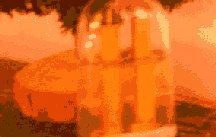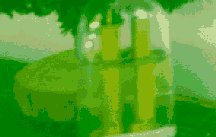 |
 |
 |
 |
 |
 |
 |
 |
|
BY AMANDA EYRE WARD The afternoon before, I had planned how I would tell her. I would begin with my age and maturity, allude to a new lover, and conclude with a bouquet of promises: grandchildren, Thanksgiving, boxes from Tiffany’s sent in time to beat the rush. I sat in my apartment drinking Scotch and planning the words. “Mom,” I said to Henry, the cat. “Mom, I have something important to discuss.” Henry stretched lazily on the balcony rail. Below, an ambulance wailed. A man with a shopping cart stood underneath my apartment, eating chicken wings and whistling. The heat had dimmed below a hundred, but the smell of New Orleans seemed to grow stronger: old meat, sweat, and beer. “Mom,” I told the cat, “please listen to what I am telling you.” Although Henry continued to ignore me, the man with the shopping cart looked up, and I took this as a good sign. I had to work that night, so after the Scotch and a small nap, I stood in front of the mirror and put on mascara. I was going for sultry European, so I took my hair in my hands and twisted it, securing the roll with bobby pins. Was this a chignon? How did one pronounce chignon? In any case, my hair was out of my face, and this would please the health department. I washed my hands with the rose-scented soap that my remaining sister had sent me, and slipped my feet into heels. As a final gesture, I drew a mole next to the left corner of my mouth. We had been told, at the Top of the Mart, to “glamorize our images.” This is a direct quote. Jimbo, the elderly owner of the club, had begun soliciting buyers for his “little piece of New Orleans history.” Top of the Mart was the cocktail lounge at the top of the World Trade Center in New Orleans. It revolved. If you sat, drinking expensive themed cocktails, for a full hour, you would see the whole city, from the lazy Mississippi River to the dilapidated downtown to the vibrant French Quarter, and back to the mighty Miss, Old Man River. So Jimbo had implored us, in his memo, to glamorize. I believe he thought that despite the old velvet plush décor, despite our advancing ages and bad attitudes, if we tarted up, he could convince some Yankee that Top of the Mart was an exclusive club, and not a tourist trap that revolved. So, why not? My old look (irritable and overtired) hadn’t gotten me many dates. Along with Winnie, I went to Payless shoes and bought a few pairs of high heels. We bought some fishnet stockings, and perfume. And then we went to Bill’s Bar and drank beer from giant cans until we ran out of quarters for the jukebox. I drove slowly to Top of the Mart. With my car windows closed and my air conditioning on, the night was lovely. People sat on their front steps drinking from paper bags and watching their children play soccer in the streets. I was one of the few white people in my neighborhood, and one of the many heavy drinkers. I waved to Christine, my landlord, who was sitting on her porch swing and braiding her daughter Lela’s hair. Her hands busy, Christine smiled and nodded in response. Things were slow up at T o’ the M. Winnie was leaning on the bar, her tight red dress leaving no inch to the imagination. Behind the bar, Linda the yoga queen mixed a martini like Tom Cruise, shaking her hips this way and that. A few customers gazed out the window. One couple was making out madly. The good thing about a revolving bar is that odious customers are soon revolved out of sight. “Look at you!” said Winnie, pointing red fingernails and laughing throatily. “What?” I said, “It’s a chignon.” Winnie and Linda looked at each other. Sometimes, I surprised them. It was a long night, and everybody wanted bourbon. When my shift was over, Linda poured me a stiff one. “I am dreading tomorrow,” I told her. “Why?” “I’m going to tell my mother I’m not coming home to New York for Christmas. She’s going to flip.” Linda sat down on her stool. She had removed every bit of her eyebrows, and drawn thin lines. “Why not?” she said. “What?” “Why aren’t you going home?” said Linda. She poured herself a glass of gin. “Oh, it’s a long story,” I said. “For one thing, I’m an adult, you know? I can’t go flying home for every holiday like I’m in college or something.” “I never went to college,” said Linda, dreamily. “And my family…well, it’s a bit fucked up, is the thing,” I said. “I wonder,” said Linda. “What?” Linda sipped her gin, and stared out the enormous windows at the sparkling city below. “I wonder who I would be,” she said, “if I had gone to college.” “I went to college,” I said, “And I’m still here.” Linda nodded. “But you’re you,” she said. On the drive home, I fantasized about my Christmas alone. I would buy a little tree for my apartment, and decorate it with lights. I could spend the day at the movies, or at the Napoleon House with my best friend Lance. Winnie had invited me to her house for turkey already, and I could watch all the little kids at her house open presents. It would be warm, not like Christmas in New York, with its bitter cold. I could even work on Christmas, and make a bundle. Jimbo paid double on holidays. I wouldn’t have to hear it from Madeleine, my remaining sister, and her venture capitalist husband, Ron. I wouldn’t have to listen to my mother, fishing valiantly for compliments, gazing wistfully at pictures of herself as she had been. And the Christmas party! My mother insisted on keeping up the Christmas party tradition, making us all don taffeta dresses, hiring the bartender from the Rye Liquor Store. She made the same meatballs, a little too sweet, and the cheese ball. The cheese ball! There must have been a time when an enormous mass of orange and pink cheese covered with nuts was fashionable, and my mother has not moved past that time. My mother, who had been a model in the seventies, who loved fondue, who made cheese balls and laughed too brightly into the faces of her friends’ husbands. The next morning was dull and hot. September in New Orleans: the thick haze of summer just beginning to dissipate. My head felt scraped out and hollow, and I did not want to open my eyes. In retrospect, this morning is when everything changed. For me, and for so many, the last dreamy edges of sleep that morning represent a different lifetime. That morning, before. When my mother, my lost sister, and Christmas were the worst of my worries. I lay underneath my sheet—it was flowered, a blue print—and wished I had a man to press my hot skin against. In my apartment, there was but a shadow of the night’s coolness. The morning’s heat was pushing its way through the windows, underneath the door, even before the sun had risen. Henry the cat stretched out and rolled over when I sat up in bed. He looked at me steadily. I rubbed my eyes with my hands and promised myself that I would not drink Scotch alone at night. Outside, I heard a crash of metal. I lived at a corner that averaged an accident a month. Whether it was the drinking habits of my neighbors or badly marked streets, it was wearying. I could close it out, however. It was outside my home. I went to the kitchen and made coffee, spooning the last of the bag into a filter. The kitchen was in the back of the apartment, and I did not have to listen to the aftermath of the crash. The digital clock on the refrigerator read 8:34. My mother would be awake soon, making Toaster-Kakes and covering them with butter. She mixed milk and sugar into her coffee. I drank mine black. While the coffee was brewing (and I did love that sound, as it dripped into the pot), I went to get the paper from my front steps. The Times Picayune, a travesty of a paper, so filled with bad writing and bad news that it was thrilling to read. The obituaries, especially, interested me. New Orleans had an inordinate amount of death. There were young heroin addicts, middle-aged gunfight victims, elderly ladies who smoked until their dying day. The coffee was strong and hot. I turned on the ceiling fan and fed Henry and settled into one of my metal chairs. The sound of an ambulance became loud and then stopped. I decided to buy a plant, a cactus, maybe, to place on the kitchen windowsill. One front page of the paper was another damn story about the Saints football team and their desire for a new stadium. “Absurd,” I said to Henry. And then the phone rang. “Honey? Caroline?” It was my mother, up early. “Hi, mom,” I said. My mother sounded close to tears, which was unusual in the morning. Generally, she only grew teary in the evenings, after too much wine. When my father had died of alcohol poisoning, she had cut back on her own drinking, but still got tipsy most nights. I sighed. I hadn’t had enough coffee to tell my mother what I had to tell her. “What’s up?” I said. “Turn on the television,” she said. “I don’t have a television,” I said, “You know that.” Thoughts flashed briefly in my mind: another promotion for my sister’s husband, a commercial featuring Rye. “Oh, sweetheart,” said my mother. She began to cry. “Mom?” I said, feeling the stirrings of alarm in my gut. “What is it?” I said, “is it Ellie?” “No,” said my mother, “no, Caroline, it’s everything.” “Calm down,” I told my mother, and how could I have known? “Jesus, mom,” I said, annoyed that she had called too early, wanting my coffee, dreading the accident in front of my apartment, my job, another night in a revolving tourist trap. It was the last moment of a sort of innocence, a way of seeing the world as infinite, a sense of safety, and thus the luxury to let life roll on, hoping that it would get better but feeling no need to make it so. There I am, in my memory: my hair is long and brown, tangled. I am wearing a silk nightgown sent by a hopeful aunt, one foot balanced on the metal rung of a folding chair, a last bit of silver nail polish peeling off my toenails. I am drinking from a blue mug that came from a tag sale down the street. It says, “#1 Boss,” although I have never been the boss of anyone. My nose is long, and my chin juts out in a manner that makes my landlord’s little girl Lela call me “witch girl,” (also this could also be due to the color of my skin; I may be the only white girl Lela knows well enough to call such things). My lips are chapped a bit; I pick at them, a habit I picked up from my mother. On my driver’s license, my eyes are classified as hazel, but boys in my past have called them blue, brown, and green. I have a strange bone in the center of my foot which juts up and makes it difficult to wear certain types of shoes. I am twenty nine, and have not had a date in eight months. In the last few months, I have begun to think about being alone forever, which would not be a bad thing. I have never seen a relationship I’d want. As for kids, I am ill-equipped. I’m impatient, hard-drinking, and I have spent days in bed with trashy novels, climbing from the sheets and pulling on sweats only long enough to grab a bag of Taco Bell (I love Mexican pizzas). What kind of a mother would I be? I work nights, I bring home strange men (not often, okay), I eat hot dogs by choice! From the gas station on the corner! Three for a dollar! I eat all three. My mother was crying on the line. “Mom,” I said, “please. Calm down. Tell me what’s going on.” “Carloliiiiine,” she wailed. “Turn on the television, turn on the television.” “Hold on,” I said, “Just hold on.” The gay couple next door usually slept late, but I felt that this was an emergency. I placed my phone on my kitchen table and ran down my stairs. I averted my eyes when I ran around the front of my apartment building, but saw it anyway, a stretcher with a body going in an ambulance. I banged on Roy and Gary’s door. “Hello!” I yelled, “Roy! Help! Let me in!” A handsome black EMT turned when I yelled, and I managed a weak smile, standing there in my pale blue nightgown. Did I look like someone’s fantasy, barefoot, my hair swirling about, my nightgown clinging? My reverie was interrupted when Gary answered the door in a shocking pair of bikini underpants, a matching eyeshade pushed over his eyes to make his blonde hair stand up straight. “What?” he said, a surly edge to his voice. Gary was the young wild thing in the relationship. I knew that Roy, twenty years older and less prone to bikini underpants, would be more understanding to my predicament. I pushed past Gary, who leaned out to see the accident and caught up to me on the stairwell. “Another accident,” I said, “It’s awful.” “Cute EMT, though,” said Gary. I pretended to be disgusted. “Roy was sitting up in bed and smoking. Gary dove back under the sheets and pulled his eyeshade down. “What’s up, Carrie?” said Roy. He wore a white T-shirt and boxers. The black jeans from the night before were hung carefully on a chair. “Can you turn on the TV?” I said, “My mom called in hysterics and she’s babbling about turn on the TV.” I sank into a velvet chair, and Henry jumped into my lap. (Henry, wily girl, traveled in and out of all the apartments, using balconies and windows to find the most interesting spot to be.) “I need some coffee,” I said. Roy nodded, put his cigarette out in the silver ashtray next to the bed. Roy and Gary’s bedroom was decorated like an opium den. There were three woven rugs pinned on the walls, the bed was made of carved mahogany and had curtains around it. There was a silver tea set and a hookah pipe, from which Roy had told me they only smoked tobacco. (When Roy was out of town, however, all sorts of young things pulled into the driveway, and who knows what they smoked. Although, judging from the packs on the lawn in the morning, Marlboro Reds.) Late at night, I was infrequently treated to the freaky sounds of sitar. “Let me make some espresso,” said Roy. “Hold on,” I said, grabbing the monkey phone. I dialed my number, which was busy. “My mom’s on the line,” I said, “Just turn on the TV, and then we can all have some coffee.” “Espresso!” said Gary, into a silk pillow. “Whatever,” I said. I found the remote control and aimed it at the enormous flat-screen television on the wall. I pushed a button. The screen bloomed with color. There was a man with a microphone, standing in the middle of Bosnia. It was a young man, covered in dust. The man was yelling into the microphone, grabbing people running past him. Why were Bosnians wearing ties? “What the fuck?” said Gary, peering from beneath his eyeshade. The journalist was blinking rapidly. The voice over said,
“There appears to be a great deal of smoke,” said Ken. “Why are the Bosnians wearing ties?” I said, and I must have spoken aloud, because Roy said, “Oh honey, that’s not Bosnia.” I looked at him, registering with a cold shock what I already knew. “Honey,” said Roy, “That’s New York.” “Aren’t you from New York?” said Gary. I don’t remember running back to my apartment, grabbing the phone, finding my poor mother still waiting on the line. “What is it?” I said, “What is it?” “We’re being attacked,” said my mother. She had grown calmer in the time since I had gone next door. “Are you OK?” I said, “Mom?” “I just don’t know what to do,” she said. “What should I do?” “I don’t know,” I said. We had nothing to say, but we did not hang up the line. I was filled with a numb thrill, at first. I was used to seeing New York under siege—I was a big fan of Bruce Willis. I can only explain it by saying that I did not believe it. I was still rooted in the sense that we were invincible, and so the sight of Manhattan in flames was exciting. It took some time before the shock numbed me and then the sadness kicked in. And then the fear. But my first emotion was excitement. “Caroline?” said my mother, after a minute or so. “Yes?” “Could you come home?” Henry looked at me. She had heard my list of reasons: age (maturity), new boyfriend, possible grandkids? I thought about my mother, and how much I hated her. “Yes,” I said. “What?” “Yes,” I said, “I’m on my way.” As soon as I hung up the phone, I knew I had made a mistake, but by then, of course, I could not get through to my mother to cancel; the phone lines to New York were jammed for days. I had not taken a vacation in so long—I lived in the tourist capital of the world, after all—that I had no idea who to call to get me from my small apartment to the stern rooms of my mother’s house in Rye, New York. I pulled out the yellow pages and rifled through the pages. Finally, I found a travel agency and dialed. “Sweetheart,” said the woman who answered the phone at AAAA Travel, “Every plane in the country is grounded.” “What?” “Turn on your television, dear!” So I went back over to Roy and Gary’s apartment, where we sat in the silky sheets and drank espresso. Roy had once lived in New York, and I was glad to have him next to me while we watched the towers fall. I was still in the vague haze; I put my hand over my mouth, but nothing sank in. I knew people that worked in the Trade Center, of course, my mother’s friends, and even my first love, James Abruzzio, who had gone from working at the Rye Shell Station to running numbers for Cantor Fitzgerald, a bond trading firm. None of this occurred to me as I sat in-between Gary and Roy. We watched the flaming city, and planned a bus route to New York that would take me back the way I had come, twelve years ago. |

B R A V E S O U L S R E C E I V E
Eyeshot's Friendly & Infrequent Update
simply type your e-mail address below, or
learn more about eyeshot-brand spamHow to Make A Funnel Cake
Miss Lola BelleWhen You Turn Everything Into Symbol,
Bad Things Happen: Part One - Pretty Girl
Zadie Smith